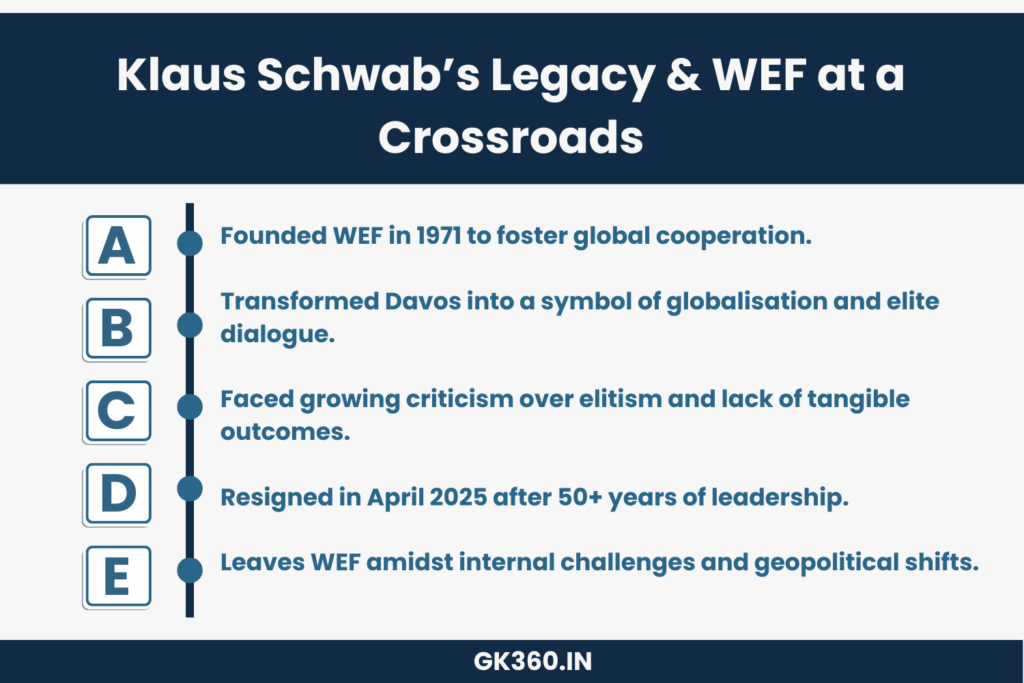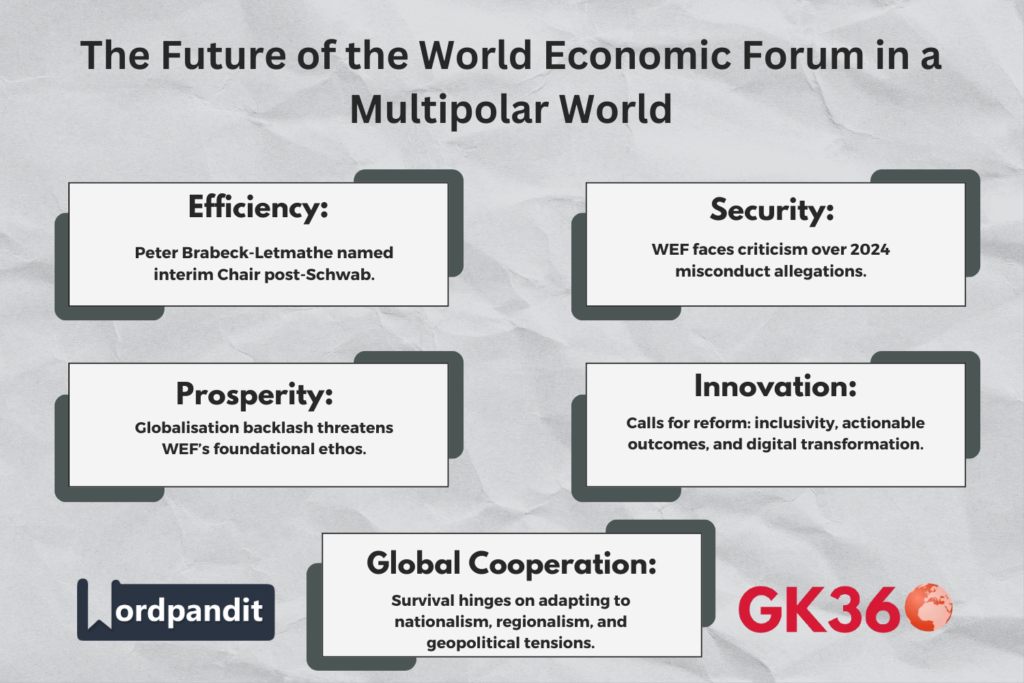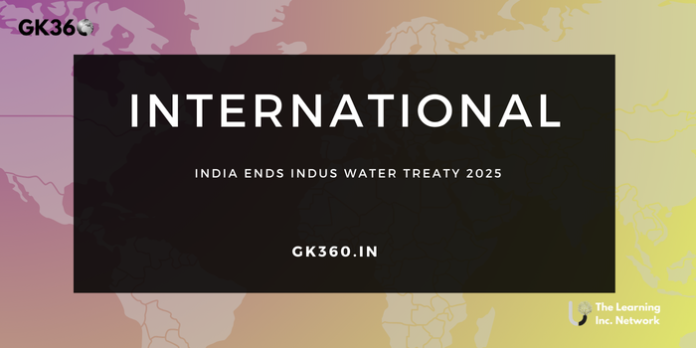Klaus Schwab Resigns: What’s Next for the World Economic Forum in 2025
Klaus Schwab, the legendary founder of the World Economic Forum (WEF), has officially stepped down after more than five decades at the helm. His departure on April 21, 2025, marks the end of an era and ushers in a moment of reflection and transition for one of the world’s most influential global institutions. Known for pioneering the annual Davos meetings, Schwab’s leadership defined an age of elite-driven international collaboration—and controversy.
With Vice Chairman Peter Brabeck-Letmathe stepping in as interim Chair, the WEF now finds itself navigating internal turbulence, public scepticism, and a new geopolitical order increasingly wary of globalisation. What lies ahead for this once-iconic platform for international dialogue?

Table of Contents
- The Legacy of Klaus Schwab and the Rise of the WEF
- Davos 2025: Symbol of Globalisation or Outdated Forum?
- Leadership Transition: Peter Brabeck-Letmathe’s Role
- WEF Under Fire: Criticism, Controversies, and Internal Challenges
- Geopolitical Shifts: Can the WEF Stay Relevant?
- The Future of Global Forums in a Multipolar World
- FAQs About Klaus Schwab, WEF, and Globalisation
- Conclusion: Reform or Decline—The Crossroads for the WEF
The Legacy of Klaus Schwab and the Rise of the WEF
Klaus Schwab launched the World Economic Forum in 1971 with a radical idea: create a space for business, political, and academic leaders to jointly solve global problems. What began as a modest European Management Symposium grew into the most high-profile gathering of global influencers—synonymous with Davos, globalisation, and elite policy dialogue.
Under Schwab’s stewardship, the Forum addressed key global issues from economic inequality to climate change. But as his influence grew, so did criticism—especially over the WEF’s perceived lack of action, elitism, and detachment from the public’s pressing concerns.
Davos 2025: Symbol of Globalisation or Outdated Forum?
The annual Davos summit evolved from a policy forum to a cultural phenomenon. From CEOs and heads of state to tech giants and celebrities, Davos attracted attention like no other think tank event.
But in recent years, critics have argued it has become more spectacle than substance. Many see Davos as emblematic of a disconnected elite—a place where world problems are discussed but rarely solved. The rise of nationalism, populism, and scepticism toward globalisation has prompted a rethinking of the event’s relevance.
Leadership Transition: Peter Brabeck-Letmathe’s Role
With Schwab’s resignation, Peter Brabeck-Letmathe, a former Nestlé CEO and Vice Chairman of the WEF, has assumed the interim Chair position. Brabeck’s corporate experience may help steady the ship, but many insiders question whether a transition from one business titan to another signals genuine change or simply continuity cloaked in a new name.
His immediate challenge: restore trust, confront internal culture issues, and redefine the Forum’s purpose in today’s fragmented world.
WEF Under Fire: Criticism, Controversies, and Internal Challenges
The World Economic Forum has come under intense scrutiny for both internal mismanagement and its perceived failure to enact meaningful change in the face of global crises.
Allegations of Misconduct in 2024
A 2024 Wall Street Journal investigation exposed troubling allegations of workplace harassment and discrimination at the WEF. While the organisation denied the charges, it initiated an independent review by a leading law firm to assess and rectify its internal culture. These revelations shook the Forum’s reputation as a moral compass of global governance.
The Globalisation Backlash
Critics accuse the WEF of symbolising the unchecked forces of globalisation—economic dislocation, loss of local identity, and widening inequality. From Brexit to the resurgence of protectionism in the U.S. and elsewhere, globalisation is no longer embraced as a universal good. Schwab himself predicted this shift in 1996, warning that citizens in industrial democracies were feeling left behind. That prescient insight now seems prophetic as populist movements dominate politics.
Geopolitical Shifts: Can the WEF Stay Relevant?
The geopolitical context in which the WEF operates has changed dramatically. Global power is increasingly dispersed. The post-Cold War unipolar world order has faded, replaced by multipolar tension, especially in the wake of the Russia-Ukraine war and growing U.S.-China rivalry.
In this fragmented landscape, multilateral platforms like the WEF must either reinvent themselves or risk irrelevance. Stakeholder capitalism—the Forum’s hallmark philosophy—now faces the ultimate test.
The Future of Global Forums in a Multipolar World
As nationalism rises and global cooperation fractures, the role of institutions like the WEF is under existential threat. The Forum, once a beacon of global consensus, now faces a world where domestic priorities overshadow international collaboration.
For the WEF to survive—and thrive—it must pivot:
- Embrace Inclusivity: Shift from elite-only gatherings to involve grassroots voices, NGOs, and emerging economies more meaningfully.
- Deliver Tangible Outcomes: Move beyond dialogue to actionable frameworks addressing climate change, digital governance, and economic inequality.
- Digital Transformation: Hybrid models and year-round virtual forums could democratize participation and reduce the perception of exclusivity tied to Davos.
Analysts argue that only by addressing these core challenges can the WEF reclaim relevance in a world driven less by globalisation and more by regionalism and sovereignty.

FAQs About Klaus Schwab, WEF, and Globalisation
- Why did Klaus Schwab step down from the World Economic Forum?
Schwab resigned at age 87 in April 2025, marking the end of his leadership due to both age and the need for institutional renewal amid growing criticism and challenges. - Who is leading the WEF after Schwab’s resignation?
Peter Brabeck-Letmathe, former Vice Chairman and ex-CEO of Nestlé, has been appointed interim Chair during the leadership transition. - What are the main criticisms of the WEF today?
The WEF is often criticised for elitism, lack of actionable outcomes, internal misconduct allegations, and being disconnected from everyday societal concerns. - How has globalisation impacted the relevance of the WEF?
The backlash against globalisation—highlighted by populist politics, protectionism, and nationalistic policies—has undermined the WEF’s foundational ethos of global cooperation. - What is the future of Davos and global economic forums?
To stay relevant, forums like Davos must adapt to a multipolar world by fostering inclusivity, focusing on real-world solutions, and embracing digital engagement models.
Conclusion: Reform or Decline—The Crossroads for the WEF
Klaus Schwab’s departure is more than a leadership change—it’s a symbolic turning point for global governance. The World Economic Forum now stands at a crossroads. Will it reform to meet the demands of a changing world, or will it fade into irrelevance as a relic of a bygone era of globalisation?
The Forum’s ability to address internal challenges, redefine its mission, and align with modern geopolitical realities will determine its future. Schwab’s legacy as a visionary is secure, but whether his creation endures depends on bold reforms and a willingness to reconnect with a sceptical global public.
Key Takeaways Table
| Aspect | Details |
| Klaus Schwab’s Resignation | Stepped down in April 2025 after 50+ years, signaling a pivotal transition. |
| Interim Leadership | Peter Brabeck-Letmathe appointed to navigate WEF through turbulent times. |
| Main Criticisms | Elitism, lack of actionable outcomes, misconduct allegations (2024). |
| Globalisation Backlash | Rise of nationalism and protectionism challenges WEF’s global cooperation model. |
| Geopolitical Shifts | Multipolar tensions require WEF to reinvent its role in international dialogue. |
| Future Strategies | Focus on inclusivity, delivering real-world solutions, and embracing digital forums. |
| Existential Crossroads | WEF must reform or risk decline amidst changing global dynamics. |





